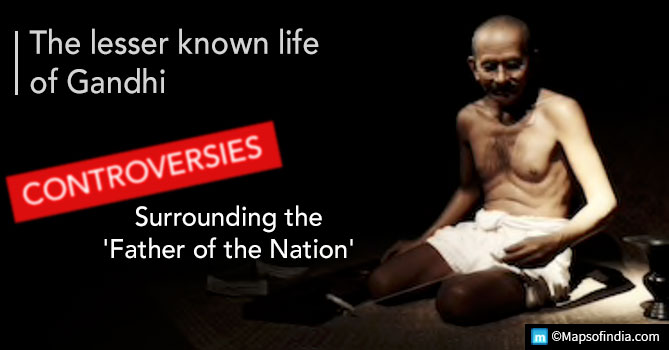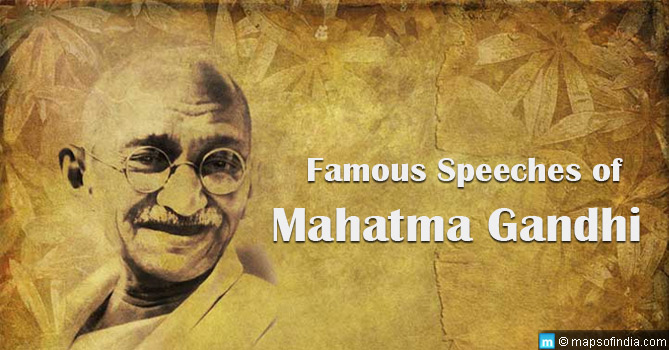
2nd October, 2019, marks the 150th birth anniversary of Mahatma Gandhi- or Bapu, as he’s often addressed. Till date, he remains one of India’s most celebrated political figures, despite it being more than 70 years since his demise.
However, not everyone remembers Mahatma Gandhi as the much-loved “icon of the poor and the masses”. Gandhi, in his entire lifetime of 78 years, managed to get quite a bit of controversies to his name. Today, we explore the three most controversial aspects of the life of Gandhi, delving deeper into the life of the Mahatma.
1) The execution of Bhagat Singh, Shivaram Rajguru, and Sukhdev Thapar
Singh-Rajguru-Sukhdev, as the trio is popularly known as, was executed in the Lahore jail on 23rd March, 1931. What preceded and followed was a nationwide movement. Amongst the voices was also a loud cry of blame- saying the “father of the nation” had failed to save the three, or had rather, not tried to do so.
There is no denying that Bhagat Singh and Gandhi belonged to entirely different schools of ideology. While Singh conformed to a radical, socialist approach, Gandhi’s Congress outlook leaned more towards capitalism, even if indirectly. Secondly, Gandhi preached non-violence, when Singh and his fellow comrades did not deny the need of a more “non-peaceful” form of resistance.
Singh, Rajguru, and Sukhdev were arrested in April, 1929- almost two years before they were ultimately sentenced to death. So, why is Gandhi often blamed for the hanging of these martyrs? The popular Gandhi-Irwin pact of March, 1931 is often mentioned in reference. The eight meetings between the two men, lasting over 24 hours, deliberated on key issues like lifting the ban on congress, returning the confiscated properties of Satyagrahis, and so on. While release of political prisoners was definitely one of the demands put forward by Gandhi- it only included the prisoners from the Civil Disobedience Movement- consequently leaving out the three revolutionaries.
Yes, Mahatma Gandhi wrote a letter to the Viceroy of India, putting in compelling words a request to stop the execution. But, it was dated March 23rd, 1931- the same day Singh was scheduled to be hanged. Gandhi had also expressed his sadness over the execution multiple times before, and after, however- people believe that had he-
a) launched a nation-wide movement to protest against the execution, or
b) been more stern with his demand of mercy for the three,
then, in all likeliness, they would not have lost their lives.
2) Gandhi’s ‘Muslim sympathising” and partition of India
Partition tore away a lot from the country- leaving behind a nation divided in two, based on religious lines. The chaos and mass-killings that followed haunt many, even as years go by. So, who was to be blamed for partition? Many name Jinnah, several others, Gandhi. To be more precise, Gandhi is accused for not preventing the partition, rather than causing it. The influence he had on the nation at that time remains common knowledge to this day. It is precisely because of his wide popularity that many believe he could have prevented the horrors of partition, had he wanted to.
In 1946, he had also famously said that “Before partitioning India, my body will have to be cut into two pieces”. Over the years, many accounts of the partition have claimed that Gandhi was more or less kept out of the loop of the final rounds of negotiations, hence, rendering him the role of a mere spectator.
Secondly, Gandhi is also put through fiery criticism for unfairly leaning towards Muslims. The blames got ignited even further when Gandhi suggested Jinnah’s name for the first Prime Minister of independent India. But, according to Gandhi, that was his attempt at preventing the nation’s partition. He never shied away from public disapprovals of partition.
Gandhi’s alleged favoritism towards Muslims and Pakistan was among the major factors ultimately leading to his assassination by Godse in 1948. Post-Partition, Gandhi went on a hunger strike, demanding Rs. 55 crores to be given to Pakistan. This move was criticised by many, including Godse. However, the sum mentioned was part of the terms of division of assets and liabilities between the two nations, post the separation.
3) Personal life of Gandhi
Bapu, with his simplistic clothing and his preachings of non-violence won the hearts of many. He was, and is still considered an iconic political and national leader, one whose popularity remains undefeated to this day. However, several aspects of his personal life remain less talked about, or hushed up to this day. And in the rare times that they come to spotlight, a series of controversies follow.
For a significant share of his life, Gandhi practiced and supported celibacy. However, his opinions and behaviour surrounding sexuality weren’t as simple as black or white. Post the death of his wife, Kasturba Gandhi in 1944, Gandhi is said to have started sleeping with naked women, far younger than him. However, there were never any further advances than that. Gandhi’s reason for doing so, was ironically, to prevent himself from engaging in any sexual activity with them. The basic idea was to test his self-control. His two grand-nieces, Abha and Manu, who also belonged to the same above-mentioned list of women, however, never seemed to bore him any ill-will.
The matter of Gandhi’s personal life, therefore, remains one very complicated to make confident assertions about. Certainly, his habits were peculiar, and ones that raised many eyebrows- including that of the first Prime Minister, Nehru.
Gandhi- A life
Mohandas Karamchand Gandhi is a name that remains etched in the hearts, and if not hearts, then definitely the minds of countless Indians. In all likeliness, it is to remain there for several decades to come. His appeal to the masses cannot be denied. Many people loved and respected him for the Bapu that they knew and believed him to be. But, who was Gandhi, really?
Who was the man that we still see every day- on our currency, his portraits on the walls of our government offices? Well, he was many things to many people. And like we know already, nothing is truly ever just black or white, right?
Related Links:
Essay on Mahatma Gandhi for Students and Teachers
Mahatma Gandhi: The Torchbearer of Cleanliness and Sanitation in India





